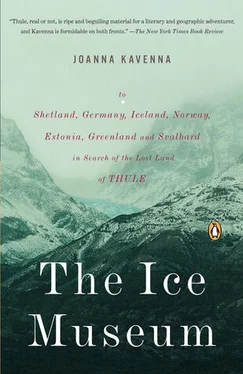None of them knew anything about a recent treaty which said they could visit Thule Mountain and return to Thule after a few years. None of them thought it would help. It was too difficult to get to their former settlement, they said; they hadn’t the money. And they couldn’t believe something as abstract as a treaty; it hardly registered as a reality. One of them shrugged. ‘Probably it won’t happen. No one will make us houses there. It would cost too much to go there. We can visit, like visitors in our old settlement. But that’s not what we want. Recently we celebrated the founding of new Thule,’ he said. ‘But it was no celebration. There was singing, dancing,’ he said, ‘but I felt sad at heart. We should not celebrate this,’ he said. ‘It was a defeat.’
Standing in Thule, puffing on my hands, my face chilled by a blasting ice wind, I stared at the rubble rocks and the drifting ice shapes. The light subsided slowly across the mountains. The lights glittered on the metallic surface of the sea.
In the morning the sky was a vivid pink. The people were silent in their houses, sleeping off the night before. As I dragged my bag from the hotel room I heard the thud of helicopter blades. The town was bathed in light, the sun was glinting through the haze, and the dogs were whining along the beach. I walked out of the settlement, towards the flat rock where the helicopter was standing. The pilot was loading a few boxes and a child with a broken leg into the back. He was an upright Dane, and we had a small tussle about my failure to have anything like a ticket. He was irritated by my inability to present the right paperwork, and he nearly slammed his door. Basic stubbornness made me persist; it was the tussle of an hour, and then the helicopter had to leave, so he told me to get in.
When the helicopter lifted into the air I looked down at the small huts of new Thule, spreading across a small patch of land. A few locals were watching the helicopter ascend, and then they turned and walked slowly towards the harbour.
It was a short flight across brilliant whiteness. We banked south towards Thule Air Base. The helicopter pilot showed no trace of strain when the helicopter moved out above the ocean; he was a stocky man wearing a tattered uniform, and he said, ‘My father came and worked at the base in the 1950s. He loved it there. Look at that stuff below! Isn’t it amazing! Beautiful beautiful ice!!’
‘Is everything normal at the air base?’ I asked.
He stopped talking, wiped his mouth, and said, ‘Normal! Normal! You’d hardly call it normal! Normal!’ he said a few more times, and laughed. ‘I love the Americans,’ he said. ‘I love them. They’re great. The Greenlanders, I love them, such a warm vibrant people. I love them so much, I married one! We live in Copenhagen! We have seven children! Seven! I love it here, but I love my wife, my children too. So I work for a month, go home for a month. It’s a hardship posting, everyone says that. But if you travel a few days north from here, you’ll see polar bears on the ice! How often do you get to see that! I’ve seen dozens of polar bears! Oh yes! I love it here.’
The child slept behind us. The pilot said, ‘People say we are mad to live here. I say to them, “What do you know?” I love it here! A month on, a month off! Perfect!’
We had just turned again when I saw a brown mountain, planed at its top like an inverted coffee cup, with the sea sliding slowly past it. This was the mountain where the Inuit had buried their dead, and further inland stood the silver rows of barracks buildings. There was a long white runway, stretching towards the mountains. The ground was dusted with snow. We hovered above the surface, and then the helicopter came to a halt on the ice.
At the entrance to the base there was a large sign: WELCOME TO THULE AIR BASE. Everything was clean and orderly. A sallow band of light stretched beneath the thick clouds. The rust-coloured slopes of the mountain stood with the pale sea beneath them. Further inland, the ice cap glittered.
The helicopter pilot was waiting for the blades to wind down. ‘Remember’—he smiled—‘be nice to them, they’ll be nice to you.’
There was an exhausted quality to the light; it made everything sepia, as if I were watching an antiquated film, its scenes crackling through the projector, the cast performing jerky movements, everything subtitled ‘US operations, Northern Greenland.’ I had thought for a while along the coast that I might find a contemporary Kurtz. These fantasies faded at the sight of the trim walls of the arrival lounge, and there was a young first lieutenant shaking my hand, smiling broadly and introducing me to two smart majors who were smiling too, stretching out their hands. They were delighted to see me, they explained. They would be glad to show me around. There was another flight out of the base in a few hours, and it was regrettable but I would have to leave then. But they could show me a few things in the meantime.
The majors were stocky men, almost identical, with their shaved heads and their broad smiles. They pointed towards the tidy barracks buildings; they nodded at the oil drums like white mushrooms, the storage containers, the heating pipes. They pointed me into a van, and dragged the door closed. Driving through the barracks-lined streets, there was no sign of anyone at all. Everyone was inside, staying out of the wind, which was blustering hard now, blowing the dust off the roads. Between the massive pipelines and the white fuel containers, there was a view across the frosted rubble to the pale sea. The sun was sliding across the sky.
Standing in the street for more than a few minutes caused shivering like convulsions, but the majors cracked jokes and laughed, slapped their hands on their knees. We left the edge of the base and the van bounced along a rock track, heading out towards the ice cap. We drove through the rubble towards the ice cap. The majors were immaculate in duty uniforms; when they weren’t laughing they spoke in fluent acronyms. They didn’t seem cold, though the windows of the van were frosting over and the wind was shaking the frame.
Everything I had seen in Greenland made me wonder why the US Military was still up there. In the Cold War a secret base made terrible sense; the quickest route for an attack on Moscow was across the North Pole. The base had been built for more than ten thousand soldiers; at the height of the Cold War it ran at full capacity. Thule Air Base had been running on a few hundred since the Cold War finished—a frosted shadow of its former self, left in the remote north. Large parts of the military city had been dismantled, many of the buildings taken away. Yet the US Military was still in Thule.
One of the majors said: ‘We’re here for BMEWS—the Ballistic Missile Early Warning System. It’s actually over there.’ He pointed towards a patch of ice in the distance.
‘Our mission,’ said the other major, ‘is to provide North America, the President, NORAD, SecDef, JCS and unified commands with warning and space surveillance. We operate a radar which continuously provides warning of sea-launched and intercontinental ballistic missile attacks against North America.
‘We also detect and track earth-orbiting objects. We monitor and control satellites,’ added the major.
We swerved along the rock roads, trailing a drift-cloud of dust. The long shining plains of snow, yawning into the distance, were like a force pitched against the majors’ certainty. The majors were ignoring them, smiling into the ice-dust, pointing out patches of significance, antennae almost obscured by the rocks and the whiteness, satellites in the distance. They waved their arms at the ice cap.
‘There’s talk about modernizing Thule Air Base, making it a crucially important place for US missile defence. This is the next phase for Thule. We will alert the Pentagon, should missiles be approaching the USA, and those missiles will be blown out of the sky,’ said one of the majors. ‘Secretary Powell has been to Greenland now.’
Читать дальше












